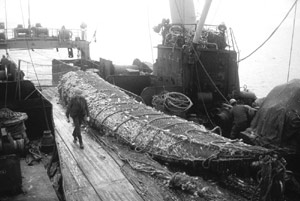 Nowhere does the FPA model address the fate of the fisheries or the fate of the fishermen and cultures that depend on those fisheries. Instead, it perpetuates the protocol that has brought the EU fish and money, and simultaneously brought the West African countries barren seas and out of work fishermen. Photo courtesy of Robert Visser, Greenpeace Nowhere does the FPA model address the fate of the fisheries or the fate of the fishermen and cultures that depend on those fisheries. Instead, it perpetuates the protocol that has brought the EU fish and money, and simultaneously brought the West African countries barren seas and out of work fishermen. Photo courtesy of Robert Visser, Greenpeace
|
But in 2002, one week after an EU-commissioned report stated concern over a _ reduction in Senegal’s commercial fishery biomass over the last fifteen years, they signed a four-year contract paying Senegal $16 million a year for bottomfish and tuna.
Nearby Mauritania’s resident fleet of 150 trawlers (partly Chinese-owned) has dropped by a third since 1996, and the octopus stock was overfished by the same amount within the same timeframe. Ten years later, Mauritania sold six years of fishing rights to 43 EU vessels for $146 million a year. Last May, Guinea-Bissau’s government signed a four-year, $42 million contract with the EU for shrimp, fish, octopus and tuna.
Not surprisingly, Africa’s fisheries could not withstand the onslaught. “The total nominal catches reported from area 34 increased almost 12 fold from about 300 000t in 1950 to close to 3.6 million tonnes in 1977,” according to the United Nation’s Food and Agriculture Association (FAO).
In 2005, one year before Mauritania’s fisheries deal with the EU, the FAO’s “Review of the state of world marine fishery resources,” reported that “Eighteen of the demersal [bottomfish] stocks assessed were either fully exploited or overexploited. One of the stocks, Epinephelus aeneus [white grouper], found mainly in Mauritania, Senegal and the Gambia, was assessed to be so overexploited that it was close to extinction.” Also fully or overexploited were sardines, lobsters, tuna and more.
As is too often the case, the fisheries negotiations were brokered far from the homes and boats of the fishermen that depend on the resource. Africa’s 2,000-mile west coast is home to an estimated 200,000 people who depend on the sea as a resource. The millions and millions of dollars paid for the fishing rights did not reach the hands of these artisan fishermen or their dependants, nor did it go to aid the fish stocks that suffered the onslaught of a heavily subsidized fleet of trawlers.
Men who fished their ancestral waters returned home empty handed after a day’s fishing, and communities that depended on the sea for both money and protein were left searching not only for food, but for a new place to live. According to the FAO, “Interactions with the more commercial large-scale fisheries has led to major problems for the traditional artisanal fishery.”
In a recent article in the New York Times, Sharon Lafraniere wrote, “In Guinea-Bissau, fishermen who were buying more boats less than a decade ago now complain they are in debt and looking to get out of the business.”
The EU insists that they are operating within the law, and they should not bear the burden of Africa’s mismanaged, pirate-infested fisheries. “The region’s governments bear much of the blame for their fisheries’ decline. Many have allowed a desire for money from foreign fleets to override concern about the long-term health of their fisheries,” said Lafraniere.
Indeed, it is this desire for money that allows the EU to continue over-fishing foreign waters. In 2006, Fabrizio Donetella, Directorate General for Fisheries and Maritime Affairs in the European Community (EC) organized a 20-page model of European Community Fisheries Partnership Agreements (FPA). The EC’s stated goals were three-fold: First, investment partnerships. Second, sustainable and responsible fisheries that satisfy mutual interests. Third, long term returns on their investments.
Nowhere does the FPA model address the fate of the fisheries or the fate of the fishermen and cultures that depend on those fisheries. Instead, it perpetuates the protocol that has brought the EU fish and money, and simultaneously brought the West African countries barren seas and out of work fishermen. The FPA model lists the notion that the EU takes fish from developing nation as a “common misunderstanding.”
The EU, Donetella reasoned, has a limited number of vessels operating in foreign waters, and these vessels are “mainly operating outside the 12 N.M. area (no/little competition with local/artisanal fleet).”
Lafraniere quotes Sid-Ahmed Ould-Abeid, leader of a Mauritanian association of fishermen: “The E.U. has the money, so it has the power. It is easier to sacrifice the local fishermen.”
Throughout history, powerful nations have created empires on the backs of less-developed, less-greedy nations. The old adage went that the sun never set on the English empire, and the same holds true, only now the sun never sets on the EU’s fishing fleet, which spreads from Greenland to Fiji to Madagascar and beyond. Globalization has brought a different sort of imperialism, an imperialism based not in the expansion of a nation, but in the expansion of a nation’s economic footprint.
|





